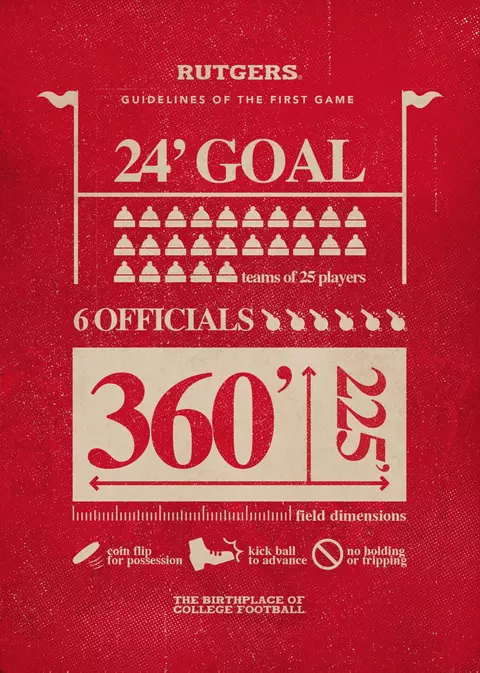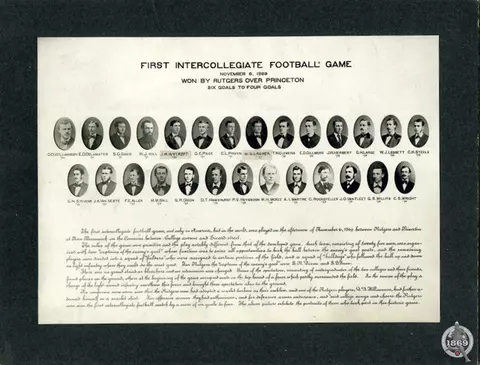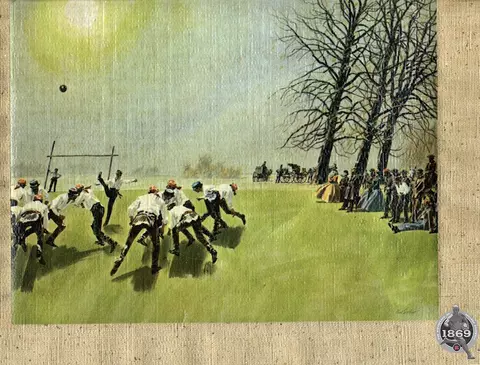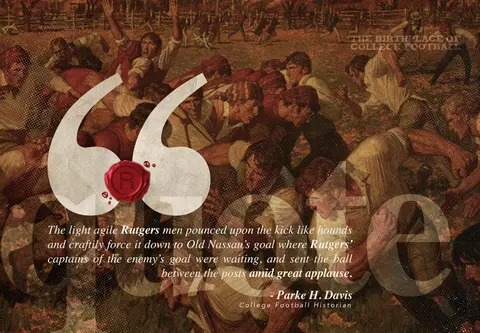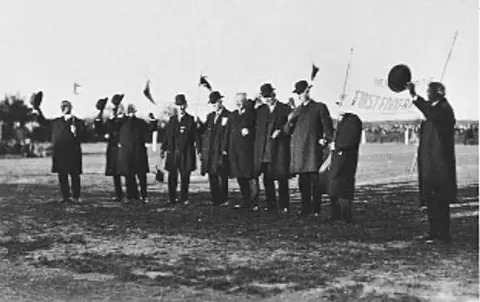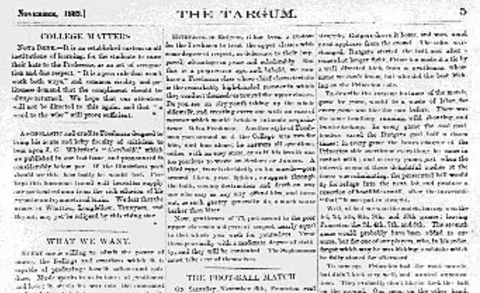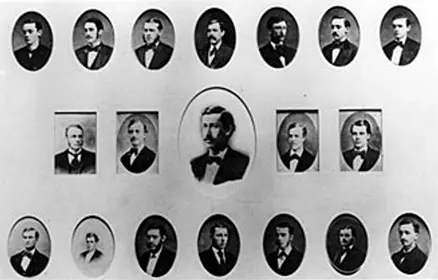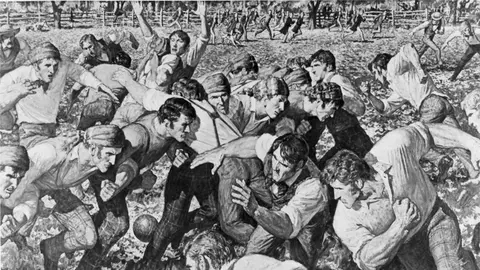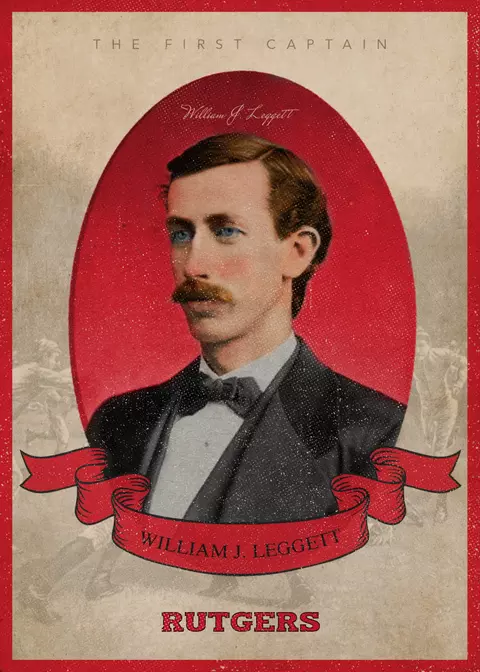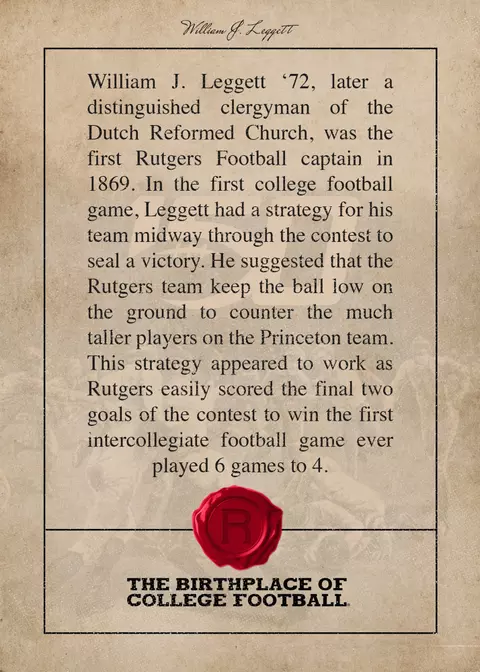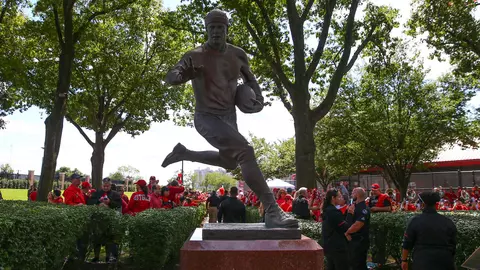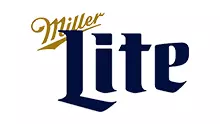THE FIRST GAME: Nov. 6, 1869
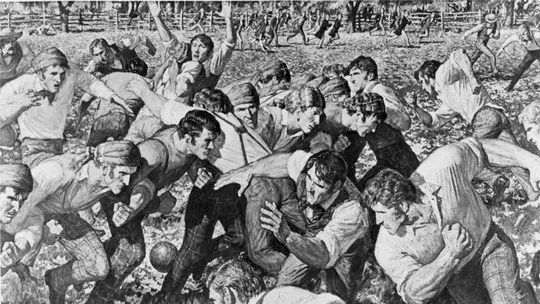
Rutgers 6, Princeton 4 | College Field, New Brunswick, N.J.
Rutgers University and its neighbor, Princeton, played the first game of intercollegiate football on Nov. 6, 1869, on a plot of ground where the present-day Rutgers gymnasium now stands in New Brunswick, N.J. Rutgers won that first game, 6-4.
The game was played with two teams of 25 men each under rugby-like rules, but like modern football, it was "replete with surprise, strategy, prodigies of determination, and physical prowess," to use the words of one of the Rutgers players.
William J. Leggett, captain of the Rutgers team who later became a distinguished clergyman of the Dutch Reformed Church, suggested that rules for the contest be adopted from those of the London Football Association. Leggett's proposal was accepted by Captain William Gunmere of Princeton, who later became Chief Justice of the Supreme Court of New Jersey.
At 3 p.m. on that memorable afternoon, the 50 combatants and about 100 spectators gathered on the field. Most of the assemblage sat on a low wooden fence and watched the athletes doff hats, coats and vests and use suspenders as belts. To distinguish themselves from the bareheaded visitors, 50 Rutgers students, including players, donned scarlet-colored scarfs which they converted into turbans.
The teams lined up with two members of each team remaining more or less stationary near the opponent's goal in the hopes of being able to slip over and score from unguarded positions. Thus, the present day "sleeper" was conceived. The remaining 23 players were divided into groups of 11 and 12. While the 11 "fielders" lined up in their own territory as defenders, the 12 "bulldogs" carried the battle.
Each score counted as a "game" and 10 games completed the contest. Following each score, the teams changed direction. The ball could be advanced only by kicking or batting it with the feet, hands, heads or sides.
Events leading up to the game were described by John W. Herbert, Rutgers '72, who was one of the players: "To appreciate this game to the full you must know something of its background," Herbert wrote in 1933. "The two colleges were, and still are, of course, about 20 miles apart. The rivalry between them was intense. For years each had striven for possession of an old Revolutionary cannon, making night forays and lugging it back and forth time and again. Not long before the first football game, the canny Princetonians had settled this competition in their own favor by ignominiously sinking the gun in several feet of concrete. In addition to this, I regret to report, Princeton had beaten Rutgers in baseball by the harrowing score of 40-2. Rutgers longed for a chance to square things."
A challenge for the game was issued by Rutgers. Three games were to be played that year. The first played at New Brunswick and won by Rutgers. Princeton won the second game, but cries of "over-emphasis" prevented the third game in football's first year when faculties of both institutions protested on the grounds that the games were interfering with student studies.
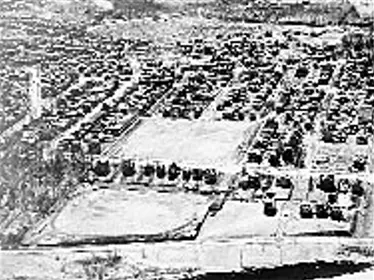
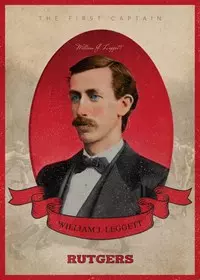
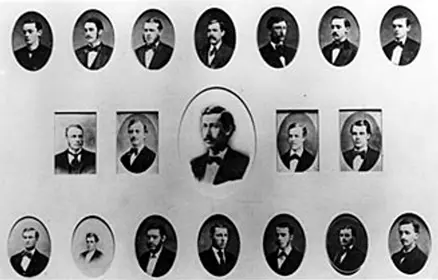
Site of the First Game
William J. Leggett
Participants of the First Game
Herbert gave this detailed account of the play in the first game: "Though smaller on the average, the Rutgers players, as it developed, had ample speed and fine football sense. Receiving the ball, our men formed a perfect interference around it and with short, skillful kicks and dribbles drove it down the field. Taken by surprise, the Princeton men fought valiantly, but in five minutes we had gotten the ball through to our captains on the enemy's goal and S.G. Gano, '71 and G.R. Dixon, '73, neatly kicked it over. None thought of it, so far as I know, but we had without previous plan or thought evolved the play that became famous a few years later as 'the flying wedge'."
Fifty years after their historic inaugural game, members of the 1869 Rutgers football team were honored at Homecoming cermonies in 1918.
Herbert then related that his teammates failed to note a conference the Princeton's captain was holding with the giant of the Tiger team, J.E. Michael, '71, known to his mates as "Big Mike."
"Next period Rutgers bucked, or received the ball, hoping to repeat the flying wedge," Herbert's account continues. "But the first time we formed it Big Mike came charging full upon us. It was our turn for surprise. The Princeton battering ram made no attempt to reach the ball but, forerunner of the interference-breaking ends of today, threw himself into our mass play, bursting us apart, and bowing us over. Time and again Rutgers formed the wedge and charged; as often Big Mike broke it up. And finally on one of these incredible break-ups a Princeton bulldog with a long accurate, perhaps lucky kick, sent the ball between the posts for the second score.
"The flying wedge thus checkmated, Rutgers might have been in a bad spot had not Madison Ball, '73, come through. He had a trick of kicking the ball with his heel. All the game he had been a puzzle to the Princetonians. The ball would be rolling toward the Rutgers goal, and, running ahead of it instead of taking time to turn, he would heel it back. He made several such plays, greatly encouraging his team. Then he capped all this by one tremendous lucky backward drive directly to Dixon, standing squarely before Princeton's goal...Dixon easily scored, giving us a one-goal lead. Big Mike again rose, however, in a berserk endeavor, and, getting the ball, he called the Princeton men into a flying wedge of their own and straight-away they took the ball right down the field and put it over."
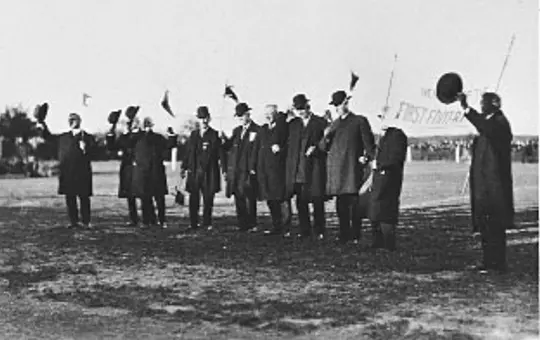
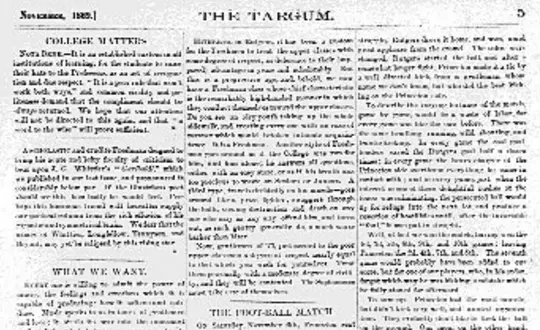
The 1869 team during Homecoming ceremonies in 1918
November 1869 issue of The Daily Targum
It was at this point that a Rutgers professor could stand it no longer. Waving his umbrella at the participants, he shrieked, "you will come to no Christian end!"
Herbert's account of the game continues: "The fifth and sixth goals went to Rutgers. The stars of the latter period of play, in the memory of the players after the lapse of many years, were "Big Mike" and Large (former State Senator George H. Large of Flemington). Someone by a random kick had driven the ball to one side, where it rolled against the fence and stopped. Large led the pursuit for the ball closely followed by Michael. They reached the fence on which students were perched, and unable to check their momentum, in a tremendous impact they struck it. The fence then gave way with a crash and over went the band of yelling students to the ground.
"Every college probably has the humorous tradition of some player who has scored against his own team. This tradition at Rutgers dated from this first game, for one of her players, whose identity is unknown, in the sixth period started to kick the ball between his own goal posts. The kick was blocked, but Princeton took advantage of the opportunity and soon made the goal. This turn of the game apparently disorganized Rutgers, for Princeton also scored the next goal after a few minutes of play, thus bringing the total up to four all."
At this point Leggett introduced strategy to turn the tide in favor of Rutgers. Noticing that Princeton obtained a great advantage from its taller players, Leggett ordered his men to keep the ball close to the ground. Following this strategy, Rutgers kicked the ninth and tenth goals, thus winning the match.An analytical account of the game appeared in the November, 1869 issue of the Targum, Rutgers' undergraduate newspaper.
"To describe the varying fortunes of the match, game by game, would be a waste of labor for every game was like the one before," wrote the student re-porter. "There was the same headlong running, wild shouting, and frantic kicking.
"In every game the cool goaltenders saved the Rutgers goal half a dozen times; in every game the heavy charger of the Princeton side overthrew everything he came in contact with; and in every game, just when the interest in one of those delightful rushes at the fence was culminating, the persecuted ball would fly for refuge into the next lot, and produce cessation of hostilities until, after the invariable 'foul', it was put in straight.
"To sum up, Princeton had the most muscle, but didn't kick very well, and wanted organization. They evidently don't like to kick the ball on the ground. Our men, on the other hand, though comparatively weak, ran well, and kicked well throughout. But their great point was the organization, for which great praise is due to the captain. The right men were always in the right place."
One of the Princeton players, William Preston Lane, in 1933 contended in a newspaper interview that Rutgers "ran us Princeton men out of town. I never found out why they did that," he related. "But we don't ask any questions. When we saw them coming after us, we ran to the outskirts of New Brunswick and got into our carriages and wagons and went away as fast as we could."
Lane's contention is refuted in the Targum account. "After the match the players had an amicable "feed together," the paper reported. "At 8 o'clock our guests went home, in high good spirits, thirsting to beat us next time, if they can."
The Daily Fredonian, a New Brunswick paper of that era, supported the Targum account in its issue of November 9, 1869.
"Though the generous liberality of the students of Rutgers College," the Fredonian reported, "a bountiful entertainment was prepared for our Princeton friends, at the favorite resort in Church Street known as Northrop's where 'mine host' and his estimable lady know how to get up a good supper."
Regardless of what actually happened after the first game, football was here to stay. Rutgers got Columbia University started in the grid sport the following season and in a few years most of the colleges and universities in the East were represented on the gridiron.
The foregoing account of America's first intercollegiate football game was prepared from material obtained from reliable sources. Previous drafts of the account were authenticated by surviving members of the first Rutgers and Princeton teams. The last surviving Princeton player, Robert Preston Lane (Class of 1872) died November 5, 1938. The last surviving Rutgers player, George H. Large (Class of 1872) died in the spring of 1939.
The First Game Collection
